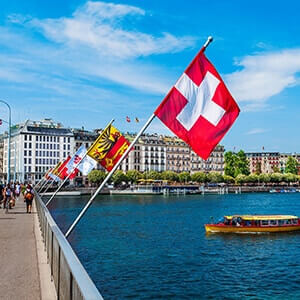Moving to Switzerland
Home to shimmering crystal lakes, the magnificent Swiss Alps and indulgent chocolates, Switzerland is well known as one of the most desirable places to relocate to. Its particularly picturesque scenes are to die for, and with a low crime rate and high life expectancy, thousands of expats flock to Switzerland each year.
If you’re looking to move to Switzerland, there is a lot you should learn about beforehand. We’ve put together the ultimate relocation guide so that you can be prepared for your move to Switzerland.
Orientation
Located in the Alpine Highlands of Western Europe, Switzerland’s mountains account for 70 per cent of the whole country. Cities of high importance in the country are located in the plateau between the Alps and Jura Mountains.
Switzerland is currently on Central European Time (CET), which is Greenwich Mean Time plus one hour, or Eastern Time in North America plus six hours. In Switzerland, Daylight Savings Time is observed in the summer, with clocks moving one hour ahead. To see the current time in Switzerland, click here.
Learning the Language
A large portion of the Swiss can speak English, so it may not be necessary for business visitors to learn any of the languages used in Switzerland. The most commonly used languages there are French, German and Italian. For longer term residents, learning common languages will help in everyday situations, such as taking public transportation and speaking to service workers. If children attend a local Swiss public school, they will need to know the language which is spoken there. Many English-speaking private schools are available for international students.
There are a number of schools located in larger Swiss towns and cities that teach German, French or Italian. You can also sign up for online classes or language apps ahead of your relocation to Switzerland.

Passports, visas and permits
Many employers provide passport, visa and permit assistance to expatriate employees moving to Switzerland. This can be offered either in-house or through an outside vendor. It’s important to take advantage of the support offered, as it will ensure that you and your company remain in compliance with laws and regulations.
Passports – When moving to Switzerland, it is important to ensure that each member of your family has their own valid passport. This should be valid for a period of time longer than your intended stay. Check with Switzerland’s nearest consulate for any additional passport requirements.
Visas – A visa is an authorization by the government of another country. This permits a foreigner to enter the country for a specific purpose and period of time. In some instances a visa can be issued on a separate paper, or electronically. Your visa may only authorize one visit as opposed to multiple entries.
Learn more about the Swiss visa application requirements and process
Customs Requirements
Customs procedures and requirements are always subject to change, so consult your shipping agent for up-to-date information.
When moving to Switzerland, household goods and other personal effects owned for at least six months can be brought into the country tax-free. All items must be listed in an inventory at the time of entrance, and any items owned for less than six months must be valued and the tax paid.
Swiss customs places limits on importing some personal goods duty free. This includes competitors, electronic and sports equipment. Ahead of your move, consult your shipper or the Swiss consulate in your country of origin for up-to-date requirements. The Swiss Federal Customs Administration is the name of the federal authority.
Required documents
To clear Swiss customs, a range of documents will be required:
- Customs Import Form
- Passport copy
- Work and residence permit
- Lease of property title of residence
- Detailed inventory list (provided in German, French or Italian)
- Appliances in shipment
- List of alcoholic beverages in shipment
Swiss customs officials are very strict regarding paperwork and enforcement, so ensure that you are prepared with all of the above documents.
Prohibited and Restricted Items
There are some items which are either restricted or prohibited to be taken into Switzerland. Items prohibited to entry include various kinds of parrots from South and Central America, monkeys, and any animal products considered endangered. There are also varying cantonal restrictions regarding the importing of firearms, although in most cases importation of two hunting rifles is permitted.
There are currently no restrictions on importing Swiss or foreign currency.
Can I Move to Switzerland for Work?
You can move to Switzerland for work if you are arriving from an EU/EFTA/Schengen country but there are different rules for each. EU residents don’t need to apply for a work visa but you will need to apply for a residence permit in Switzerland. Schengen country members, such as those moving from the UK will need to apply for a work visa too. You may need to apply for the following:
- A Swiss work visa or relevant student study visa
- A family visa if you are coming to Switzerland with a family
- If moving permanently, apply for the Swiss C Residence Permit
- Otherwise you will still need to apply for a temporary residence permit

Taking a pet
Pets are welcomed in Switzerland, with dogs appearing in restaurants, trains, and in other service areas. The Swiss insist on public cleanliness, and as such provide special receptacles for animal waste.
All dogs, cats and ferrets are permitted to enter Switzerland commercially from EU countries, rabies-free or rabies controlled countries. Pets from other countries are only allowed to enter the country within 5 days of their owners.
Unaccompanied pets or pets that are older than three years old are subject to an inspection by a border veterinary officer. You must also present a vet certificate, which confirms your pet has been vaccinated within the last year, or at least 30 days prior.
Pet important restrictions
There are a number of restrictions in place in Switzerland for those wishing to import pets:
- Importation of dogs with clipped ears or tails is prohibited. An exception is made for dogs owned by foreigners relocating to the country.
- Birds may have to quarantine upon arrival.
- Monkeys and certain types of parrot are prohibited.
Always check with the Swiss Federal Veterinary Office for the latest requirements.
Other pet considerations
Whilst pets are allowed in Switzerland, there are a number of factors to consider. Ahead of your move, check with your landlord if pets are allowed in your new home, as very few apartment complexes allow them.
Dogs must be kept on a lead at all times in public spaces, and dog kennels can fill quickly. If you’re planning a holiday, be sure to book your dog into your local kennel early to ensure that space is available.
Taking a vehicle
A motor vehicle that has been in the owner’s name for six months or more may be imported into the country duty-free as a personal effect, as long as the vehicle is used for personal driving purposes for one year after entry. Vehicles owned for less than six months may be imported, but you will be required to pay duties.
Purchasing a vehicle
Most expats coming from abroad decide not to take their own vehicles with them, as the importation process can be complicated and expensive. If you’re looking to purchase a vehicle in Switzerland, here are your options:
- Purchase a new vehicle – There are various types of new motor vehicles available for sale in Switzerland, that are often sold for less than in other European countries. If you wish to choose a certain colour or accessory, there can be waits for up to three months.
- Purchase a used vehicle – Used vehicles are widely available and are generally of good value. Used cars are usually cheaper in cities such as Geneva and Zurich. When you purchase a used vehicle, you may need to display a certification that the vehicle has passed a stringent road test, called a Motor-fahrzeugkontrolle (MKF).
Vehicle inspection
Vehicles require to be inspected by the Swiss Motor Vehicle Bureau, and a series of adjustments may be necessary for North American models. It is advisable to have these done before entering the country to avoid high expenses. It is also advisable not to import older cars, as making the required repairs can become costly.
If you are importing a vehicle, you can drive with foreign plates for only one year. Once the year is over, the vehicle is called in for a service inspection as a prerequisite for Swiss plates.
Finances
Switzerland has a strong reputation in the world of banking and finance, with its institutions among the largest in the world. Of the many types of Swiss bank accounts, the Swiss numbered account is perhaps the most well-known. There are also Swiss cantonal bank accounts and investment funds.
In all of the larger banks in Switzerland, there will always be someone who speaks English. Most expatriates will apply for a cash card, which is used to get money from an ATM machine. Credit cards are also issued by local banks. Online banking is also an option with all Swiss banks, with single electronic payments being easily executed. Mobile banking apps are also readily available.
Changing money
Currency exchange facilities are available in Switzerland, with banks, hotels and tourist agencies able to provide facilities. Offices at airports and larger railway stations do business seven days a week. However it is a good idea to arrive in Switzerland with some money in Swiss francs. Exchanging money at the bank is generally recommended.
Finding a home
Although housing is widely available in Switzerland, it is advisable to allow two months to find the right accommodation. The market for real estate is competitive, so we would advise you to work with an agent. Agencies can be helpful for locating housing for new arrivals, whether you’re looking to rent or buy on a short or long term basis. Agents may require a registration fee, which is normally valid for three months. If the search for housing is successful, the agent may charge a fee comparable to one month’s rent. Housing costs are a crucial aspect to consider when comparing the cost of living in Switzerland vs the UK.
Buy or rent in Switzerland?
Most expats, like the majority of the Swiss, rent an apartment or house. This option can save considerable red tape involved in buying property.
Home prices in Switzerland are high, making renting a more feasible prospect. Whatsmore, renting is the only option for housing in cities. Note, there are restrictions placed on foreigners purchasing a home in Switzerland.
Short term housing options
The majority of cities in Switzerland offer temporary housing options for those searching for short-term accommodation. Hotels, while offering extended stay options, do not generally have cooking facilities. There are however some apartment complexes in the major Swiss cities, that have furnished apartments available, and rooms that can be rented by the week. The furnishings are adequate, and this can be a great option for those on a short term business relocation.
Driving in Switzerland
If you plan on driving in Switzerland, there are a few factors you should be aware of beforehand. International Driver’ Permits, accompanied by valid national licenses, are accepted for one year in Switzerland. A Swiss license will be required after this period. If your home country is in the EU, you will be able to obtain a Swiss driver’s license easily without a test. However if your home country is outside of the EU, you will have to pass a driving test.
In Switzerland, it is the vehicle, not the person, which is insured to drive. If your home country is outside of the European Union, we would suggest taking out a new insurance policy in Switzerland. Discounts are offered to people who have had no claims, however evidence of this is required when applying.
Swiss roads are excellent, however you should be cautious when driving in Winter. The rural routes winding through the Alpine valleys can be dangerous, and even a light snow shower makes driving difficult. When road conditions are poor, be sure to drive slowly and allow extra time to arrive at your destination.
The Swiss take particular pride in their road system, and repairs are prompt and of high-quality. International road signs are used, and whilst not in English, the symbols used are understandable.

Public Transportation
Mass transit and public transportation options in Switzerland are comprehensive and uniformly excellent. Rail is the preferred means of travel between most cities, however there are also more options:
- Airport – Airports in Switzerland are all well served by mass transit. A number also have rail connections, in addition to taxi and bus services.
- Bus – There are local city and suburban bus systems as well as the national PTT PostBus system. The bus system in Switzerland has an outstanding service and safety record, with various reduced fare plans available. The buses are also equipped with wifi, which is a bonus.
Religion and worship
The vast majority of residents in Switzerland are Christian, followed by Roman Catholic. Many other religions are represented in Switzerland too, such as Islamic, Judaism and Jewish practises. The Swiss are very tolerant of religions, and English services can be attended in the major cities such as Geneva, Zurich and Basel.
Social life in Switzerland
The people of Switzerland tend to be private, and getting to know them initially can be tricky. Fortunately, there are many well organised clubs and activities to engage in to get you mixed into the local community, with both the locals and expatriates alike. These clubs vary from sporting activities to outdoor adventures, with a wide range available for everybody. If you are relocating with family, international schools in Switzerland also have programmes that will provide a ready-made introduction to the expatriate community.
Since the outdoors is a vital aspect of the Swiss lifestyle, many activities will incorporate this. If you’re looking to meet some of the locals, getting involved in hiking and skiing is a great way to do so (if you’re an adventure seeker).
Alcohol & Drinking
Alcohol, particularly wine and beer, is a part of everyday life in Europe, especially at mealtime. The legal age for drinking in Switzerland is 16, though teenagers are rarely seen drinking in public. In general, the Swiss drink as a social activity. Law enforcement is very strict in Switzerland, and if one is seen drinking underage or drink driving, heavy fines and possible imprisonment is the punishment.
Interested in information on another country? Take a look at our other International Relocation guides.
Great customer Experiences start here
Very pleasent and helpful. Nothing too much trouble.
Mr M H moved from London, UK to Toronto, Canada
Very helpful and patient even when things got packed that we had to get out again!
Mr M E moved from Enfield, UK to Dorset, UK
Thanks to Graham, Nick and the entire crew!
Mr C D M moved from UK to Singapore
Friendly and helpful crew.
Ms T W moved from USA to Cambridgeshire, UK
